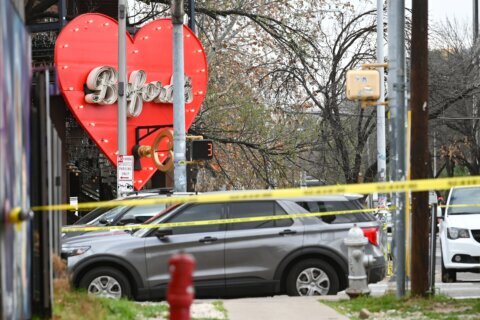WASHINGTON — Two weeks after the mass shooting that left 17 dead, students and staff at a Parkland, Florida, high school returned to class for the first time on Wednesday.
And as it takes a step toward healing, the Stoneman Douglas High School community is left to face what amounts to a new normal, said a survivor of 1999’s Columbine massacre.
“You really have to redefine what ‘normal’ is,” said Frank DeAngelis, who was principal of the Jefferson County, Colorado, high school when two gunmen killed 12 students and a teacher before taking their own lives.
“It’s never going to be what it was prior to Feb. 14, 2018,” DeAngelis told WTOP’s Debra Feinstein and John Aaron.
For DeAngelis — who’s discussed the healing process with Stoneman Principal Ty Thompson — such attacks still trigger post-traumatic stress nearly 19 years later, he said.
“In all of the shootings, whether it’s Sandy Hook or Virginia Tech … they all had an impact,” he said. “But this one was so similar to what we experienced at Columbine — the number of students, and then you had three staff members who put themselves on the line to protect their kids.”
DeAngelis added that the footage of kids running out of school with their hands over their heads “was eerily similar.”
“Fortunately for me, I got into counseling early,” he said, “and I will be talking to my counselor within the next couple of days just to deal with some of the emotions that I’m feeling right now.”
Because such post-traumatic stress is so new among the Florida survivors, DeAngelis said he advised school officials to be aware of potential triggers, such as slamming doors, popping balloons or fire alarms.
“And unfortunately, there may be additional threats coming into the school as they return, and how do you deal with that?” he said. “What are those emotions going to be like if they have to go into a lockout or lockdown?”
The retired principal also expressed concern that the resources that might be available for Stoneman underclassmen might not be so easily accessible for graduating seniors: “… Just because they graduate does not mean some of the emotions they’re feeling, some of the post-traumatic stress disorder is not going to follow them,” he said.
But amid this pain, DeAngelis said, he reminds survivors that there is hope.
“When I do go to these communities to offer support,” he said, “the first thing I tell them is, ‘It’s a marathon, and not a sprint.’”








